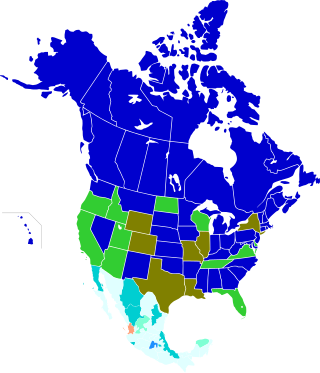Related Research Articles

CIH, also known as Chernobyl or Spacefiller, is a Microsoft Windows 9x computer virus that first emerged in 1998. Its payload is highly destructive to vulnerable systems, overwriting critical information on infected system drives and, in some cases, destroying the system BIOS. The virus was created by Chen Ing-hau, a student at Tatung University in Taiwan. It was believed to have infected sixty million computers internationally, resulting in an estimated NT$1 billion (US$35,801,231.56) in commercial damages.

In the United States, a district attorney (DA), county attorney, county prosecutor, state's attorney, prosecuting attorney, commonwealth's attorney, state attorney or solicitor is the chief prosecutor or chief law enforcement officer representing a U.S. state in a local government area, typically a county or a group of counties. The exact scope of the office varies by state. Generally, the prosecutor represents the people of the jurisdiction. With the exception of three states, district attorneys are elected, unlike similar roles in other common law jurisdictions.

A prosecutor is a legal representative of the prosecution in states with either the adversarial system, which is adopted in common law, or inquisitorial system, which is adopted in civil law. The prosecution is the legal party responsible for presenting the case in a criminal trial against the defendant, an individual accused of breaking the law. Typically, the prosecutor represents the state or the government in the case brought against the accused person.
Character evidence is a term used in the law of evidence to describe any testimony or document submitted for the purpose of proving that a person acted in a particular way on a particular occasion based on the character or disposition of that person. In the United States, Federal Rule of Evidence 404 maps out its permissible and prohibited uses in trials. Three factors typically determine the admissibility of character evidence:
- the purpose for which the character evidence is being used
- the form in which the character evidence is offered
- the type of proceeding in which the character evidence is offered
The legal age of consent for sexual activity varies by jurisdiction across Asia. The specific activity engaged in or the gender of participants can also be relevant factors. Below is a discussion of the various laws dealing with this subject. The highlighted age refers to an age at or above which an individual can engage in unfettered sexual relations with another who is also at or above that age. Other variables, such as homosexual relations or close in age exceptions, may exist, and are noted when relevant.

In North America, the legal age of consent relating to sexual activity varies by jurisdiction.
Rape is a type of sexual assault initiated by one or more persons against another person without that person's consent. The act may be carried out by physical force, under threat or manipulation, by impersonation, or with a person who is incapable of giving valid consent.
A private prosecution is a criminal proceeding initiated by an individual private citizen or private organisation instead of by a public prosecutor who represents the state. Private prosecutions are allowed in many jurisdictions under common law, but have become less frequent in modern times as most prosecutions are now handled by professional public prosecutors instead of private individuals who retain barristers.
In common law jurisdictions, statutory rape is nonforcible sexual activity in which one of the individuals is below the age of consent. Although it usually refers to adults engaging in sexual contact with minors under the age of consent, it is a generic term, and very few jurisdictions use the actual term statutory rape in the language of statutes. In statutory rape, overt force or threat is usually not present. Statutory rape laws presume coercion because a minor or mentally disabled adult is legally incapable of giving consent to the act.

In the United States, each state and territory sets the age of consent either by statute or the common law applies, and there are several federal statutes related to protecting minors from sexual predators. Depending on the jurisdiction, the legal age of consent is between 16 and 18. In some places, civil and criminal laws within the same state conflict with each other.
In common law, the principle of prosecutorial discretion allows public prosecutors a wide latitude to decide whether or not to charge a person for a crime, and which charges to file. A similar principle in continental law countries is called the principle of opportunity.
Rape in the United States is defined by the United States Department of Justice as "Penetration, no matter how slight, of the vagina or anus with any body part or object, or oral penetration by a sex organ of another person, without the consent of the victim." While definitions and terminology of rape vary by jurisdiction in the United States, the FBI revised its definition to eliminate a requirement that the crime involve an element of force.
Child sexual abuse laws in the United States have been enacted as part of the nation's child protection policies.
Rape is a statutory offence in England and Wales. The offence is created by section 1 of the Sexual Offences Act 2003:
(1) A person (A) commits an offence if—
(2) Whether a belief is reasonable is to be determined having regard to all the circumstances, including any steps A has taken to ascertain whether B consents.
(3) Sections 75 and 76 apply to an offence under this section.(4) A person guilty of an offence under this section is liable, on conviction on indictment, to imprisonment for life.
Algeria is a transit and, to a lesser extent, destination country for men and women subjected to trafficking in persons, specifically forced labor and forced prostitution. Most commonly, sub-Saharan African men and women enter Algeria voluntarily but illegally, often with the assistance of smugglers, for the purpose of traveling to Europe. Some become victims of trafficking: men may be forced into unskilled labor and women into prostitution to repay smuggling debts. Criminal networks of sub-Saharan nationals in southern Algeria facilitate this irregular migration by arranging transportation, forged documents, and promises of employment. Reliable statistics on the number of potential victims are not available from the government or non-governmental organizations (NGOs). One NGO estimates that the populations most vulnerable to trafficking include between 10,000 and 15,000 illegal sub-Saharan African migrants.

The Office of the Director of Public Prosecutions (ODPP) is the National Prosecuting Authority in the Republic of Kenya as established by the Constitution of Kenya, which de-linked it from the Office of the Attorney General and established it as an independent office. The office is empowered with the authority to exercise the State's powers of prosecution with regard to criminal proceedings.
Prosecution of gender-targeted crimes is the legal proceedings to prosecute crimes such as rape and domestic violence. The earliest documented prosecution of gender-based/targeted crimes is from 1474 when Sir Peter von Hagenbach was convicted for rapes committed by his troops. However, the trial was only successful in indicting Sir von Hagenbach with the charge of rape because the war in which the rapes occurred was "undeclared" and thus the rapes were considered illegal only because of this. Gender-targeted crimes continued to be prosecuted, but it was not until after World War II when an international criminal tribunal – the International Military Tribunal for the Far East – were officers charged for being responsible of the gender-targeted crimes and other crimes against humanity. Despite the various rape charges, the Charter of the Tokyo Tribunal did not make references to rape, and rape was considered as subordinate to other war crimes. This is also the situation for other tribunals that followed, but with the establishments of the International Criminal Tribunal for the former Yugoslavia (ICTY) and the International Criminal Tribunal for Rwanda (ICTR), there was more attention to the prosecution of gender-targeted crimes with each of the statutes explicitly referring to rape and other forms of gender-targeted violence.
Rape laws vary across the United States jurisdictions. However, rape is federally defined for statistical purposes as:
Penetration, no matter how slight, of the vagina or anus with any body part or object, or oral penetration by a sex organ of another person, without the consent of the victim.
Sexual consent plays an important role in laws regarding rape, sexual assault and other forms of sexual violence. In a court of law, whether or not the alleged victim had freely given consent, and whether or not they were deemed to be capable of giving consent, can determine whether the alleged perpetrator is guilty of rape, sexual assault or some other form of sexual misconduct.
A criminal proceeding in French law is one carried out in the name of society against a person accused of a criminal offense by applying the French penal code. It is taken in the name of society, in that its goal is to stop disruption of public order, and not to abate personal damages done to a specific person, which is governed by French civil law.
References
- Hausmaninger, Herbert (1998), The Austrian Legal System, Kluwer Law International, ISBN 978-90-411-1014-5
- Huang, Yuan-sheng (2000), 民初法律變遷與裁判 : 1912-1928, Taipei: National Chengchi University, ISBN 978-88-8050-902-8, OCLC 48141957
- Kurosawa, Mutsumi (November 2006), "明治初期の告訴権・親告罪 : 刑事実体法における関連諸規定の概観", Toyama University Journal of Economic Studies, 52 (2): 403–430, archived from the original on 2011-07-18
- Ota, Tatsuya (2007), "The development of victim support and victim rights", in Chan, Wing-Cheong (ed.), Support for Victims of Crime in Asia, Taylor and Francis, pp. 113–148, ISBN 978-0-415-43585-7
- "친고죄 [親告罪, Antragsdelikt]", Doosan Encyclopedia , 2009, retrieved 2011-02-10